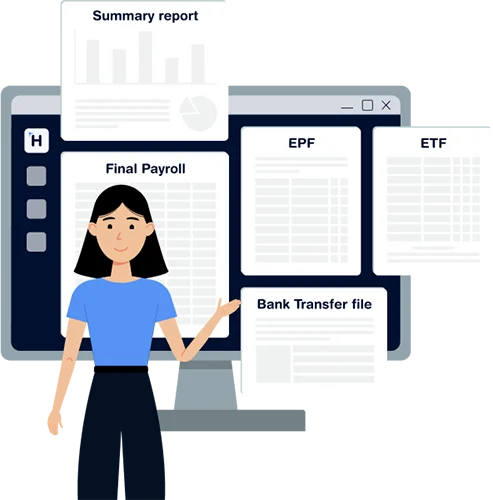Based on exploring ETF in brief in our previous articles, this article will go through a complete look at ETF for small businesses to deepen your understanding of the subject matter.
What is ETF?
The ETF was established on March 1st 1981, under the ETF Act No. 46 of 1980. All the private sector employees and public sector employees who are not entitled to the pension scheme given by the government are members of the ETF. At the same time, their employers are required to contribute 3% of their employees’ monthly gross earnings to the ETF. Therefore, the employer contributes to the ETF on behalf of the employee, whereas in EPF, both the employer and employee should contribute.
By December 2019, the ETF achieved a total of Rs. 339 billion, while 2.6 million employees are active members of the ETF, on behalf of whom nearly 79,000 employers are contributing to the fund.
As a small business, it is worth noting that you are legally bound to pay ETF contributions for the following types of employees:
- Pensioned employees.
- Students who are more than 14 years of age working after school.
- Employees working in your business and another business at the same time.
- Employees who rotate or migrate from one place to another.
- Contract workers.
- Individuals who have received a refund and re-employed.
- Emigrant employees.
- Casual or piece-rate employees.
What is the ETF board, and how do they govern the ETF scheme?
The ETF board was established under the ETF Act No. 46 of 1980 and started its operations on March 1st 1981, under the guidance of the Ministry of Labour. The ETF board governs the ETF scheme, and the ETF board is presently functioning under Minister Basil Rajapaksa of the Ministry of Finance, Economy and Policy Development.
The following are the essential features of the ETF board:
- Collecting ETF contributions from employers.
- Prudent investments of ETF.
- Providing extensive social and welfare benefits to its members and compensates ETF claims.
- Implementing strict actions such as tracking down nonpaying employers and collecting surcharge income.
- Maintaining the accounts of ETF members and issuing annual member statements.
- Declaration of a dividend to members according to the annual profits earned by the ETF.
- Registering self-employed business owners and migrant workers as members of ETF.
The ETF board governs the ETF scheme by ensuring that:
- Employee ownership, employee welfare and economic democracy are promoted.
- To ensure that the participation of employees manages ETF through acquiring equity interest in enterprises.
- Non-contributory benefits for the employees are provided on retirement.
- Necessary actions will be taken to achieve the factors set out in 1, 2 and 3.
Now that we understand the ETF board and its governance over the ETF scheme, we will look at how ETF and EPF are calculated.
How to calculate ETF and EPF in Sri Lanka for small business staff?
Unlike EPF, employers are not required to deduct ETF contributions from the employees’ monthly earnings. The employer is required to calculate 3% of the ETF contributions on the total monthly gross earnings of the employees. That being said, the total monthly gross earnings should include:
- Salary, wages or fees.
- Allowances such as cost of living allowance, special living allowance and allowances similar in nature.
- Holiday payments.
- The monetary value of cooked or uncooked food provided by the employer to the employee. However, such values will be decided by the Department of Labour.
- Food allowance.
- Any remuneration.
- Commissions, piece-rate payments and contract basis payments.
Although this article is based on ETF, we must explore how EPF in Sri Lanka is calculated as well for you to compare the differences when calculating the two types of social security schemes.
In calculating EPF, the employee should contribute 8% of their total monthly earnings by deducting from the employee’s salary, and the employer should contribute an amount equal to 12% of the employee’s total monthly income. Thus, the following components need to be taken into consideration when calculating the total monthly earnings:
- Salary, wages or fees.
- Allowances such as cost of living allowance, special living allowance and allowances similar in nature.
- Holiday payments.
- The monetary value of cooked or uncooked food provided by the employer to the employee. However, such values will be decided by the Department of Labour.
- Food allowance.
- Any type of remuneration.
- Commissions, piece-rate payments and contract basis payments.
However, components such as overtime payments, reimbursable travelling expenses and incentives should be excluded when calculating the total monthly earnings.
Therefore, it’s essential to carefully consider these components when calculating ETF and EPF payments to avoid potential miscalculations.
What are the different ETF forms for small businesses to handle staff ETF?
Small businesses should consider that there are two types of ETF forms to handle staff ETF. The two ETF forms are the ETF R4 form and the ETF R1 form.
ETF R4 form
If a small business has less than 15 employees, ETF contributions should be paid under the R4 form, and member details should be filled in the same form.
Here’s a downloaded PDF version of the ETF R4 form. ETF R4 form.pdf
ETF R1 form
If a small business has 15 or more than 15 employees, ETF contributions should be paid under the R1 form, and member details should be submitted every 6 months in a different return called the Form ll return. When filling out the member details in the Form ll return, the employee’s correct name according to the employee’s NIC, NIC number, correct member number, and ETF contribution are required.
Here’s a downloaded PDF version of the ETF R1 form ETF R1 form.pdf and an excel sheet of the Form ll return. Formats-of-Form-II-Return-Reconciliation-Summary
Is there only a single ETF office or several ETF offices across Sri Lanka?
It’s interesting to note that there is not just one ETF office but, there are several ETF offices across Sri Lanka. Apart from the main ETF office in Narahenpita, the other ETF offices are:
- ETF office Gampaha
- ETF office Galle
- ETF office Kalutara
- ETF office Kandy
- ETF office Anuradhapura
- ETF office Kurunegala
- ETF office Kegalle
- ETF office Jaffna
- ETF office Vavuniya
- ETF office Nuwara Eliya
- ETF office Trincomalee
- ETF office Hatton
- ETF office Ratnapura
- ETF office Matara
- ETF office Badulla
- ETF office Hambantota
- ETF office Ampara
How can my small business remain on top of ETF payments and compliance?
As mentioned above, there are two types of ETF forms, namely the R1 form and the R4 form depending on the size of the small business. If you’re a small business with 15 or more than 15 employees, you should submit the duly filled R1 form with a cheque, money order or cash payment. On the other hand, if you’re a small business with less than 15 employees, you should submit the duly filled R4 form with a cheque, money order or cash payment. If you don’t submit the R1 or R4 forms, the ETF board will not accept the ETF payments.
To simplify how you could remain on top of ETF payments and compliance, we have noted the necessary information under the subheadings below.
Payment modes
You don’t necessarily have to pay the ETF contributions manually through cheque, money order or cash payment, as you can also make payments through the internet.
Last date to pay ETF contributions
You should make sure that you pay the ETF contributions on or before the last day of the following month.
Penalties for delayed payments
- 5% surcharge – for a delay, not more than 10 days.
- 15% surcharge – for a delay between 11 days – 1 month.
- 20% surcharge – for a delay between 1-3 months.
- 30% surcharge – for a delay between 3-6 months.
- 40% surcharge – for a delay between 6-12 months.
- 50% surcharge – for a delay of more than 12 months.
Penalties for employers making ETF contributions under the R1 form
All employers paying ETF contributions through the R1 form should provide half-year returns to the ETF:
- 1st half return – on or before August 31st.
- 2nd half return – on or before February 28th.
If employers fail to comply with paying the half-year returns, the employer is liable to a 1% surcharge every month of delay on the face value of the return by the employers.
Therefore, it’s essential to ensure that you shouldn’t overburden the business by not complying with ETF payments as a small business.
Therefore, we come to an end to this article. We hope that you were able to gain a comprehensive understanding and knowledge of ETF, as it’s essential to understand the governing body of ETF, its statutory footing and compliance.
Resources
https://etfb.lk/about-etf-board/
https://etfb.lk/welcome
https://etfb.lk/employers-faq/
https://etfb.lk/employed-members/
https://etfb.lk/branches/



